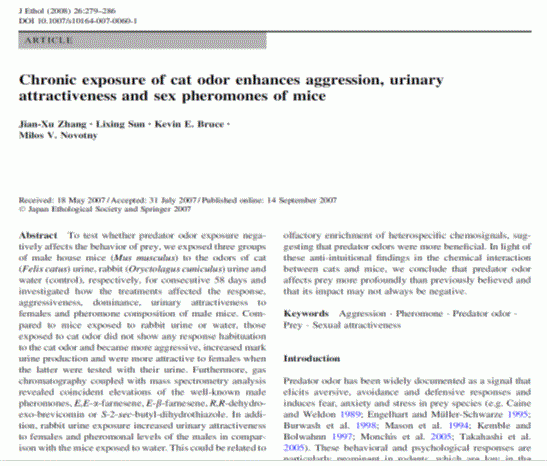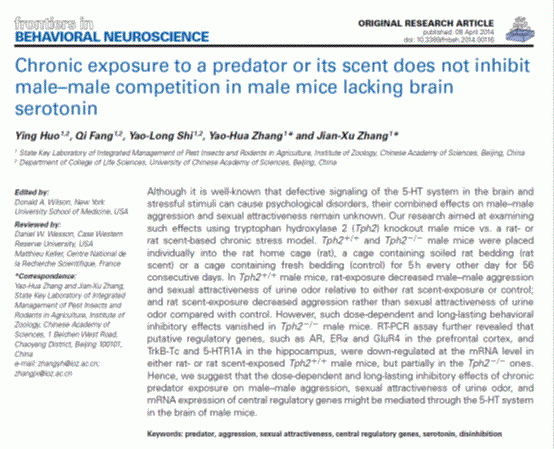博文
猫让老鼠更性感,“吓大”的孩子更有爱
||
这项 猫-鼠 研究说明, 年轻时经历些压力,长大后有好处,并有神经生物学基础。但是,压力的种类和强度要选正确!
第一部分: CAT-MOUSE模型,预期相反的结果
这是一项与预测结果相反的研究,有点惊讶!
最初的实验是想测天敌气味的信息 对老鼠有抑制作用。把几只猫的尿液收集,混合,给每个毛细管转入2 微升的猫尿,挂在老鼠笼子的网盖外,只能嗅闻到,而无法接触的位置。老鼠用的是8周龄的ICR-CD1雄性小白鼠,每笼一只。连续实验8周。两个对照组,提供装有水,或 兔子尿液的毛细管。
最后, 提供猫尿的雄鼠,反而表现出更强的攻击行为,打败对照组, 尿液中的雄性信息素(如法尼稀)含量增高,尿液气味对雌性也表现出更强的吸引作用。
论文发表在日本的 行为学杂志 Journal of Ethology, 影响因子 IF很低,不成想,被 LiveScience 记着注意到了, 给我来email 要求采访, 说好 用email采访, 提了10个问题,一一回答, 他以 猫和老鼠的主人公汤姆 Tom 和杰瑞 jerry 联系起来,也和春药联系起来。
LIVESCIENCE 发表以后,国际各大新闻网几乎都转发了,国内的 新华社海外网(news.xinhuanet) 在一个月后还在转发。 (见最文章后面的附录 )(sexier 和 more sexy 哪个合适?)
第二部分: RAT-MOUSE模型进一步验证
我们后来又印证了上述现象。 把小鼠养在大鼠气味弥漫的屋子里,小鼠也会出现攻击行为增强,对异性吸引增强, 并且雄鼠尿液的蛋白信息素 Darcin 也显著升高 (2017 Chemial Senses)。
Rat (大鼠,褐家鼠)有一个奇特的现象 专杀小鼠(mouse-killing)行为! 在自然环境,它们都是家栖性害鼠,生活环境重叠,党褐家鼠遇到小家鼠会杀死它, 因此RAT常常被作为小鼠的天敌,这在心理学上和神经生物学上常用到。
又进一步利用 Rat-Mouse 这个模式,证明天地气味的刺激使大脑 蓝斑(LC)的肾上腺皮质激素释放因子(CRF)的受体(CRFR1)表达升高,增强了小鼠应对天敌应激的能力 (与心理所合作 发表在 2020 年 Frontiers in Psychology)
第三 RAT-MOUSE, CAT-MOUSE应激强化模型并不总是有积极作用
我们如果把小鼠放到大鼠的巢材上进行刺激,小鼠要接触到尿液中的挥发性以外的成分,尤其 MUP蛋白信息素,这样与对照组就没有出现差异。(Frontiers in Behavioral Neuroscience)。
在20年前, 我们用有着非常难闻气味的黄鼠狼肛腺的分泌物抹在 金仓鼠 (golden hamsters)的鼻端,进行刺激。 金仓鼠的攻击行为和内分泌激素都受到抑制,当时用的刺激强度很大 (2003年 Physiology and Behavior)。
Rat—Mouse, Cat-Mouse 应激模型 一定不要接触到尿液,只闻味道。至少在CAT和RAT 尿液中还有 蛋白信号,只有接触后才产生作用。
附录
Cat Urine Makes Mice Macho
By Charles Q. Choi, Special to LiveScience posted: 09 May 2008 12:36 am ET
Tom and Jerry may never get along, but cats could help mice get lucky in love.
Cat odor is known scare mice away, but it also seems to act like an aphrodisiac for the rodents, a new study shows.
The smell makes male mice more macho, helping lure in females, researchers said.
Just a whiff
Unsurprisingly, past studies had found that cat odor typically causes mice to panic or flee, although there are parasites that can hijack rodent brains and make them suicidally seek felines out.
Scientists had expected that stressing out normal mice would put a dent in their love lives. Scared mice aren't sexy mice.
To see if a whiff of cat might serve as a mouse repellent to help keep rodent pests away, researchers exposed mice to cat pee for eight weeks.
Unexpectedly, two months of cat odor did not lead to cowering mice, as one might expect from constant threatening. Instead, researchers found it led to aggressive males. These were more than twice as likely fight with other mice than rodents exposed to rabbit urine for the same amount of time.
And such combative males smelled delectable to females. When presented with male pee, females that were in heat spent more time sniffing urine from males exposed to cat odor for weeks than ones that had inhaled rabbit fumes.
New thinking
Before, it was generally believed that the presence of predators always had a negative effect on their prey, "but our findings show that presence of low or moderate predation may be positive to prey," said researcher Jian-Xu Zhang, a pheromone researcher at the Institute of Zoology of the Chinese Academy of Sciences in Beijing.
Female mice like aggressive males, and rodents constantly exposed to cat pee may seem like strong males that can survive the constant threat of predators, the researchers suggested.
These findings could help improve life for animals in captivity, Zhang said. Zoos could enrich the environments of animals with just a whiff of their predators to stimulate them.
Zhang and his colleagues detailed their findings in the May issue of the Journal of Ethology.
新华社海外网再次撰稿报道我所的研究发现
Discovery: Scent of a feline makes male mice more sexy. www.chinaview.cn,2008-06-19 20:00:49 by Xinhua science writer Yu Zheng (http://news.xinhuanet.com/english/2008-06/19/content_8401950.htm)
BEIJING, June 19 (Xinhua) -- If you have ever wondered why Jerry the animated mouse was also cozying up to tormented feline Tom, Chinese scientists say they have the answer. They hope their finding will someday help in understanding human depression.
According to the recent finding by a rodent zoologist and his research group, a male mouse is more attractive to potential mates if his scent features even the faintest whiff of his arch enemy --the common house cat.
Zhang Jianxu, author of two cat and mouse tales that appeared in the respected scientific publication "Chemical Senses" and "The Journal of Ethology", respectively, said a mouse would appear more macho and attractive to the opposite sex if its odor included that of cat's urine.
In an interview with Xinhua on Thursday, Zhang said he worked with Sun Lixing from Central Washington University and Kevin Bruceand Milos Novotny, both from Indiana University, to research predator-prey interaction between cats and mice.
Zhang, who lives in Beijing, and the three U.S.-based scientists studied changes in the male mouse urine that had been affected by cat urine. This in turn received a favorable reaction from female mice.
A scientific judge from "The Journal of Ethology" ofJapancalled the findings of the research paper "new and interesting."
"The authors substantiate their results with a chemical analysis showing an increase of the pheromones (chemicals that enable same-species communication) in the urine of experimental mice," he wrote.
Predator odor has been widely documented as something that scares prey, induces anxiety and stress, and, understandably, lowers the female preference for males.
Such an academic understanding has been employed by industries to develop repellents that contain certain smells of predators to fend off prey. Due to an extensive knowledge on insect odors, mosquito or bug repellents are manufactured and have largely proved effective. Almost anyone spending lengthy periods of time outdoors is equipped with such repellents.
Previous studies have shown that chronic exposure to predator odor reduced aggression and disrupted the love lives of rodents.
In the past, an overwhelming amount of research has been done on the relationship between predator pressure and prey behavior. In contrast, very little information was available on the effect of predator odor-induced stress on pheromonal change and its consequence in social behavior in prey species, said Zhang of the Chinese Academy of Sciences (CAS) Institute of Zoology.
Mammalian pheromone production is controlled by hormones. This helps stimulate cells' functions, which have a profound and diffusive effect on animal behavior.
In their studies, Zhang's team kept 48 sex-naive male mice, which were eight weeks old when purchased, for 58 days.
The scientists exposed the mice to a tiny dose of cat urine in hair-thin tubes. After repeatedly inhaling the cat fumes, the urine of the affected mice was tested and revealed coincident elevations of two male pheromones -- the alpha and beta farnesenes, the exact chemicals that drive female mice crazy.
With innovative spectrum analysis, the researchers, for the first time, pinpointed the two chemicals that had previously been missed.
For comparison, they also designed two other groups that were exposed to rabbit urine and water respectively. They discovered that the cat odor-treated males were more likely to initiate an attack than those treated with rabbit urine or water.
"The levels of the male pheromone compounds which indicate dominance became significantly higher in mice exposed to cat urine," Zhang said.
"The key to this provocative result was that predator odor might stimulate preputial glands secretion to produce sexually-attractive farnesenes in urine; estrous females spent significantly more time in investigating the urine of those males."
Although the effects of predators and their odors were reported to suppress rodent behavior, physiology and reproduction, the latest finding suggested potent evidence of sexual attractiveness and dominance.
A plausible explanation on why the suppressed poor mice were more attractive to females was that they were more motivated to keep fit and be ready to attack, or, more precisely, counter-attack. Stronger males were able to survive high predation pressure.
An animal olfactory mechanism study has fanned the enthusiastic curiosity among biologists.U.S.biologist Linda Buck won the 2004Nobel Prize in physiology for unraveling the sense of smell.
Zhang has initiated a collaborative research with psychologists, hoping his newly-found cat-mouse model can be used to extend the understanding of human depression and bring insight to depression treatment.
Editor: An Lu
https://blog.sciencenet.cn/blog-3433666-1236401.html
上一篇:”鼠老大“的 “爱恨情仇” 全在它的一泡 尿液 里
下一篇:百岁教授 王所安 曾著首部“脊椎动物学”教科书





